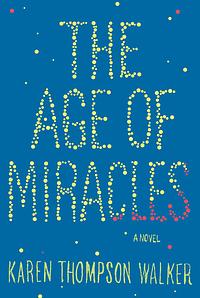Take a photo of a barcode or cover
While this book wasn't quite what I expected, I did enjoy it.
I thought this book would go more into the solutions for the worldwide disaster. I pictured it overflowing with science and engineering... inventors trying to fix the Earth. Instead, it was the story of how this major event affected the life of a middle school girl.
Like I said, though, I did enjoy the story. I found a lot of parallels between the disaster of "the slowing" and the changes that come about in Middle School. The loss of contact. The strangeness of the changes in culture, in personalities, in living. I tried to read it as an allegory and sometimes that fit very well, but in places is was baggy or pulled tight: not a perfect fit.
Julia's story is worth reading. The affect on the slowing on ordinary people is heartbreaking at times. The rumors, fear, anger, and sadness feel like what would really happen in such an event. I liked how the accumulation of the disaster is shown. I just had to suspend my scientific disbelief at times.
Overall, I did enjoy this book, even if it wasn't what I expected to read. It's a coming of age novel, set in an age when the world is rather mirroring the microcosmic turmoil of being a young adolescent.
I thought this book would go more into the solutions for the worldwide disaster. I pictured it overflowing with science and engineering... inventors trying to fix the Earth. Instead, it was the story of how this major event affected the life of a middle school girl.
Like I said, though, I did enjoy the story. I found a lot of parallels between the disaster of "the slowing" and the changes that come about in Middle School. The loss of contact. The strangeness of the changes in culture, in personalities, in living. I tried to read it as an allegory and sometimes that fit very well, but in places is was baggy or pulled tight: not a perfect fit.
Julia's story is worth reading. The affect on the slowing on ordinary people is heartbreaking at times. The rumors, fear, anger, and sadness feel like what would really happen in such an event. I liked how the accumulation of the disaster is shown. I just had to suspend my scientific disbelief at times.
Overall, I did enjoy this book, even if it wasn't what I expected to read. It's a coming of age novel, set in an age when the world is rather mirroring the microcosmic turmoil of being a young adolescent.
I received this book as part of a national marketing campaign. I probably would not have purchased the book based on the jacket description.
That said, it was a decent book.
It is written from the perspective of 12 year Julia about what she, her family, and the world were experiencing due the "slowing." The rotation of the earth has slowed to a point that days and night become 48+ hours long.
While well written, the characters could have been better developed. I don't get a sense of how this event affects them emotionally.
Also, I would expect much more drama if this type of event occurred in real life.
Light read, not a lot of depth.
That said, it was a decent book.
It is written from the perspective of 12 year Julia about what she, her family, and the world were experiencing due the "slowing." The rotation of the earth has slowed to a point that days and night become 48+ hours long.
While well written, the characters could have been better developed. I don't get a sense of how this event affects them emotionally.
Also, I would expect much more drama if this type of event occurred in real life.
Light read, not a lot of depth.
Wow. Probably would have never picked this up. So glad the airport clerk recommended it to me. Loved it.
I have had this book in my collection for so long that I cant remember whete it came from. I've moved with it at least 3 times, probably more. I finally settled down to read it recently....and couldn't put it down. The author writes with so much atmosphere, such depth, tenderness, and grief, that this book feels like an old friend with deep wounds that are only numb because of how familiar they are. I really enjoyed this book.
A lovely, unique and thought-provoking book that I read awhile ago and forgot the name of until it was recommended to me as similar to others I’ve liked. Highly recommended!
adventurous
dark
emotional
hopeful
mysterious
reflective
sad
fast-paced
Plot or Character Driven:
A mix
Strong character development:
Yes
Loveable characters:
Yes
Diverse cast of characters:
No
Flaws of characters a main focus:
Yes
How many times have you wished for more hours in a day? I do it all the time, either when I want an extra day of sleep, or when I have tons to complete in an impossible time span. In The Age of Miracles, your wish comes true - the days start getting longer. It's called "the slowing," and days grow longer, sometimes by hours, sometimes by minutes. But when you're wishing for extra time to accomplish things, you don't think about the consequences - and there are intense consequences.
Daylight might last longer than twelve (or twenty, or forty) hours, but that means night lasts just as long. There's confusion over how to account for time; schools are unattended, businesses don't know when to open. The government eventually insists that the world continue on our standard twenty-four hour clock, now called "clock time." However, some portions of the population want to live naturally: they stay up during daylight, even if the sun is still shining at 2am; they try to sleep for the entire time of darkness. As "clock time" becomes widely accepted, those who live on "real time" are harassed until they leave to form their own communities.
There are also issues of the slowing of the earth's rotation affecting tides, gravity, and global warming. When the sun shines for over twenty-four hours straight, it gets too hot to go outside. You get sunburned through your clothes. Likewise, the long stretches of night get unbearably cold.
In the middle of this changing landscape is Julia, an eleven-year-old girl who is trying to find her place in her school's social standing, her family, and herself. She is incredibly wise, despite living in a time of unknown variables. She struggles with loneliness, keeping friends, and becoming close to the boy on whom she's had a long-term crush.
The concept itself is fascinating and took over my mind from start to finish, and still has a grip on my imagination. It is also beautifully written. Certain sentences were so perfect, I teared up. Though the concept is (hopefully!) impossible and fantastic, the whole idea, paired with gorgeous writing, really makes you appreciate things you have now. Ex: When a spaceship was sending up a disc of information about the history of the 21st century, in case there are others in the universe who might someday find it, Julia notes, "Not mentioned on the disc was the smell of cut grass in high summer, the taste of oranges on our lips, the way sand felt beneath our bare feet…"
Daylight might last longer than twelve (or twenty, or forty) hours, but that means night lasts just as long. There's confusion over how to account for time; schools are unattended, businesses don't know when to open. The government eventually insists that the world continue on our standard twenty-four hour clock, now called "clock time." However, some portions of the population want to live naturally: they stay up during daylight, even if the sun is still shining at 2am; they try to sleep for the entire time of darkness. As "clock time" becomes widely accepted, those who live on "real time" are harassed until they leave to form their own communities.
There are also issues of the slowing of the earth's rotation affecting tides, gravity, and global warming. When the sun shines for over twenty-four hours straight, it gets too hot to go outside. You get sunburned through your clothes. Likewise, the long stretches of night get unbearably cold.
In the middle of this changing landscape is Julia, an eleven-year-old girl who is trying to find her place in her school's social standing, her family, and herself. She is incredibly wise, despite living in a time of unknown variables. She struggles with loneliness, keeping friends, and becoming close to the boy on whom she's had a long-term crush.
The concept itself is fascinating and took over my mind from start to finish, and still has a grip on my imagination. It is also beautifully written. Certain sentences were so perfect, I teared up. Though the concept is (hopefully!) impossible and fantastic, the whole idea, paired with gorgeous writing, really makes you appreciate things you have now. Ex: When a spaceship was sending up a disc of information about the history of the 21st century, in case there are others in the universe who might someday find it, Julia notes, "Not mentioned on the disc was the smell of cut grass in high summer, the taste of oranges on our lips, the way sand felt beneath our bare feet…"
Terrifying, heartbreaking, thought-provoking, and beautiful -- one of the best books I've read this year.
This is an interesting juxtaposition of genres, with a girl's coming of age amidst the potential doom of science fiction. The premise is quite clever - the earth's rotation begins to slow, and the days and nights grow just a little longer with each revolution. Soon the clocks bear no relation to the length of a day, and those in the world must deal with the new reality and its effect on the natural world. 12-year-old Julia must deal with the changes this has wrought on her family, her best friend, her neighborhood and her world, while trying to make sense of her own confusing middle school life. It's a thought-provoking novel.





